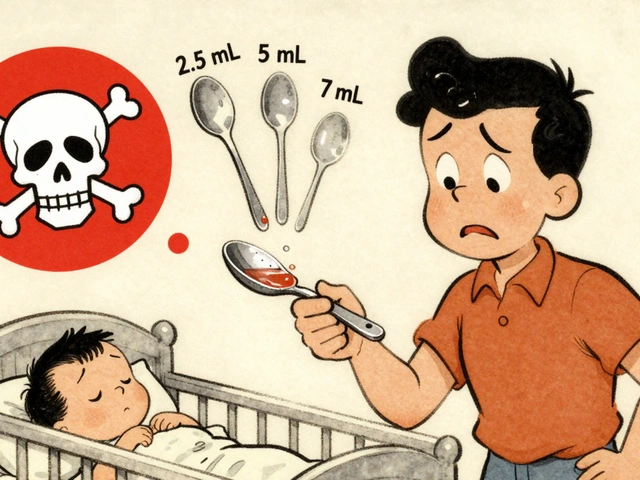Introduction to Worm Infections and IBS
As someone who has experienced the discomfort and frustration of irritable bowel syndrome (IBS), I know firsthand how important it is to understand the potential causes and triggers of this condition. One connection that has gained attention in recent years is the link between worm infections and IBS. In this article, I will explore this connection in depth, discussing various aspects of both worm infections and IBS to help you better understand the relationship between the two.
Common Types of Worm Infections
Before diving into the connection between worm infections and IBS, it's essential to understand the common types of worm infections that can affect the human body. Parasitic worms, also known as helminths, can cause a range of health issues depending on the type of worm and the severity of the infection. Some of the most common worm infections include:
- Roundworms: These parasites live in the intestines and can cause abdominal pain, diarrhea, and other gastrointestinal issues.
- Tapeworms: These flat, segmented worms attach to the intestinal wall and can grow quite long, leading to a range of symptoms including abdominal pain, nausea, and weight loss.
- Hookworms: These small, bloodsucking worms can cause anemia, abdominal pain, and diarrhea.
- Whipworms: These worms live in the large intestine and can cause bloody diarrhea, abdominal pain, and weight loss.
How Worm Infections Can Affect the Gut
Worm infections can have a significant impact on our gut health, leading to various symptoms and complications. When these parasites invade our intestines, they can cause inflammation, disrupt the balance of our gut bacteria, and damage the intestinal lining. This can lead to a range of gastrointestinal issues, such as diarrhea, constipation, abdominal pain, and bloating.
Moreover, the presence of these parasites can also impact the immune system's response in the gut, leading to increased inflammation and potentially contributing to the development of IBS.
IBS: A Brief Overview
Irritable bowel syndrome is a common gastrointestinal disorder characterized by abdominal pain, bloating, and changes in bowel habits, such as diarrhea or constipation. The exact cause of IBS is not well understood, but it is believed to involve a combination of factors, including genetics, environmental triggers, and disruptions in gut bacteria. IBS can significantly impact an individual's quality of life, making it essential to understand and address potential contributing factors, such as worm infections.
Studies Linking Worm Infections to IBS
Several studies have suggested a connection between worm infections and IBS. For instance, a study published in the American Journal of Tropical Medicine and Hygiene found that individuals with IBS were more likely to have a history of worm infections than those without the condition. Another study published in the journal Gut found that people with IBS were more likely to have antibodies to the parasite Giardia, indicating a past infection.
While these studies do not prove that worm infections cause IBS, they do suggest a potential link between the two conditions, warranting further investigation.
Treating Worm Infections to Improve IBS Symptoms
If you suspect that a worm infection may be contributing to your IBS symptoms, it's essential to consult with a healthcare professional who can diagnose and treat the infection. Treatment for worm infections typically involves prescription medications that target the specific type of worm involved. Successfully treating a worm infection may help alleviate some IBS symptoms and improve overall gut health.
Preventing Worm Infections to Support Gut Health
Preventing worm infections is an essential aspect of maintaining gut health and potentially reducing the risk of IBS. Some effective prevention strategies include:
- Practicing good hygiene, such as washing hands frequently and thoroughly, especially before preparing food and after using the toilet.
- Cooking meat thoroughly to kill any parasites that may be present.
- Washing fruits and vegetables thoroughly before consumption.
- Avoiding contact with contaminated water sources, such as swimming in ponds or lakes where parasites may be present.
Conclusion: The Connection Between Worm Infections and IBS
In conclusion, there appears to be a connection between worm infections and irritable bowel syndrome, although more research is needed to fully understand the relationship between the two conditions. If you suffer from IBS, it's crucial to consider the potential impact of worm infections on your symptoms and take appropriate steps to prevent and treat these infections. By addressing this potential contributing factor, you may be able to improve your gut health and overall quality of life.





Thank you for shedding light on this often‑overlooked connection between parasitic infections and IBS, it’s truly enlightening :)
While the article is comprehensive, one must consider the nuanced epidemiological data before drawing broad conclusions.
It is evident that the gut ecosystem operates as a complex, interdependent network wherein parasitic helminths can modulate immune pathways altering mucosal integrity thereby influencing symptomatology associated with functional gastrointestinal disorders such as irritable bowel syndrome research across diverse populations has repeatedly demonstrated correlations between endemic helminthiasis and altered bowel habits yet causality remains elusive the mechanistic plausibility revolves around parasite‑induced Th2 skewing, regulatory T‑cell expansion and microbiota reshaping which together may predispose to visceral hypersensitivity these immunological shifts are not isolated events they intersect with dietary patterns, psychosocial stressors, and genetic predispositions creating a multifactorial tapestry that defies reductionist explanations furthermore, longitudinal studies evaluating post‑treatment outcomes reveal heterogeneous responses; some patients experience marked relief while others see negligible change suggesting that worm eradication alone is insufficient without addressing underlying dysbiosis and central nervous system modulation the literature also warns against over‑reliance on serological markers for past Giardia exposure as they may linger long after clearance thus confounding diagnostic clarity finally, clinicians must exercise judicious assessment, incorporating stool microscopy, antigen testing, and detailed travel or exposure histories before initiating antiparasitic therapy to avoid unnecessary medication exposure and resistance development.
I appreciate the thoroughness of the previous comment and would add that personalized dietary adjustments alongside targeted antiparasitic treatment can synergistically improve patient outcomes when gut flora is restored.
Listen folks the mainstream narrative ignores the fact that many of these “studies” are funded by pharma looking to sell more drugs and they conveniently downplay the role of hidden government trials on population health.
The discourse would benefit from a more rigorous appraisal of methodological standards, particularly regarding sample size calculations and the potential for selection bias in retrospective analyses.
Interesting points, good read.
While the observation is brief, it fails to engage with the extensive data presented earlier which highlights the necessity of a multifaceted therapeutic approach.
One must also consider the covert influence of undisclosed biotechnological entities that may manipulate epidemiological reporting to align with clandestine agendas.
Good summary of the key points.